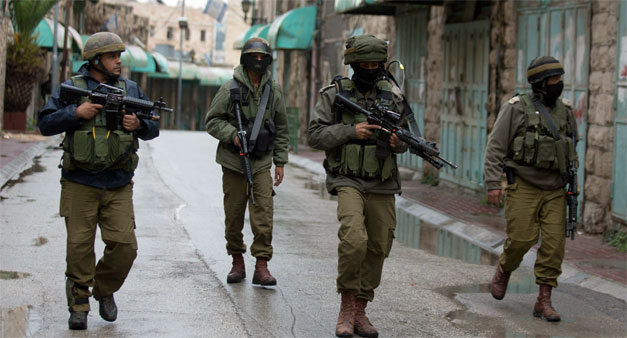AFP/ West Bank
New knife attacks on Israelis in the West Bank left a soldier lightly wounded Thursday, while two Palestinian assailants were shot dead by security forces, police and the army said.
While a spate of protests and attacks in Jerusalem has eased, tensions have flared in Hebron, where near-daily clashes pit youths against Israeli soldiers enforcing the decades-long occupation of the West Bank.
The volatile city has also been the scene of several knife attacks against Israeli soldiers.
In one attack on Thursday a Palestinian stabbed and lightly wounded an Israeli border guard near a shrine in Hebron known to Jews as the Cave of the Patriarchs and to Muslims as the Ibrahimi Mosque.
"A Palestinian attacked and stabbed a soldier. Security forces responded and shot the attacker. The soldier sustained light injuries," the army said.
Police spokesman Micky Rosenfeld confirmed that the attacker had died. The Palestinian health ministry identified him as 23-year-old Mahdi Al Mohtaseb.
In the second incident a Palestinian, Farouq Sider, 19, allegedly tried to stab an Israeli soldier in Hebron, where several knife attacks have taken place in recent days.
"The Palestinian assailant attempted to stab an IDF soldier at a security post," read an army statement.
Police spokeswoman Luba Samri said the attacker had been shot dead.
Both attacks were followed by clashes between Palestinian youths and Israeli security forces, according to an AFP journalist on the scene.
A wave of such knife attacks and shootings has left nine Israelis dead since early October.
The death of the attackers takes the number of Palestinians killed in the recent unrest to 62. Many of those killed have been shot in anti-Israeli protests.
One Israeli Arab attacker has also been shot dead.
Protests in Hebron in recent days have erupted over Israel's policy of withholding the bodies of attackers, one of a series of measures to try to dissuade attacks on Jews, which began in early October as tensions over the Al-Aqsa mosque compound in annexed east Jerusalem boiled over.
Palestinians have long feared Israelis seek to change the rules governing the site, which is sacred to both Muslims and Jews.
Israeli Prime Minister Benjamin Netanyahu has repeatedly denied seeking to allow Jews to pray at the compound, which they refer to as the Temple Mount.
Only Muslims are allowed to pray within the compound, while non-Muslims can visit but not pray there.
Another one of government's deterrent measures is speeding up the practice of razing the family homes of alleged attackers.
The Supreme court on Thursday examined appeals over plans to destroy six homes, and is set to rule on Monday.

